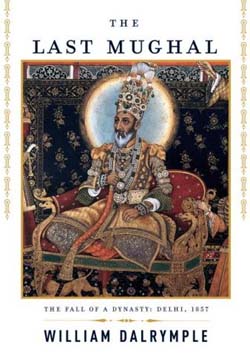Jan 13, 2026
Jan 13, 2026
Poor Bahadur Shah Zafar. He was woefully sidelined in life. In death, things have only gotten worse. Not only has he been woefully sidelined in the book purportedly devoted to him, but his only claim to fame, his literary output has been challenged, even as he is vilified as a good-for-nothing weakling. There is no information of Zafar's long life before he came to the throne. Was the Mughal court that devoid of any developments of any sort for those sixty years before its crown prince finally came to the throne?  The Last Mughal, by William Dalyrmple has undoubtedly made very much thicker by pages of compliments, but what about its rendering of the story of 1857 and the Last Mughal, Bahadur Shah Zafar?
The Last Mughal, by William Dalyrmple has undoubtedly made very much thicker by pages of compliments, but what about its rendering of the story of 1857 and the Last Mughal, Bahadur Shah Zafar?
Of the 486 page story, how much is actually about Bahadur Shah Zafar and his environs? The bias would be obvious with a simple page count in each chapter which reveals that against 223 pages which tell the Indian story; almost 263 give the British viewpoint.
There is an amazing amount of detail about life for the British in 1857, with elaborate flourishes of verbal embroidery; comparatively very little of the Indian overall picture. Yes, all the possible negatives of the Mughal court are lovingly delineated. But it is difficult to digest that amongst all those thousands of princelings, nawabs and adventurers etc who descended on Delhi in 1857, there was not one single person of any military or other type of leadership or vision? Was that actually so?
Despite the loud claims of exhaustive research from new sources, the only new references to the ordinary people of Delhi are one sentences references to the horse seller, the prostitute, the dhobi and other Delhi locals.
The records of the Mughal court itself, which would be an obvious reference point, seem to be absent. When did the Mughal courts do away with records and daily diaries, which are endemic in any Indian court?
The book is totally Delhi centric. The other 1857 developments are barely mentioned in passing, whether the greased cartridge flashpoints, the mass upsurges in central India and elsewhere. Even Kanpur and Lucknow get short shrift in the telling of the Delhi story. When has India been so rift as to be totally unaware of what is happening elsewhere?
There is much use of verbal embroidery, beautiful or gruesome as the case may be. For the Indian viewpoint, heavy reliance on Ghalib, Zahir Dehlavi, Hakim Assunullah Khan primarily. Poor Ghalib has been so vilified as a luxury loving traitor, a self-serving dodder. Was he really? One wonders about his reputation and the reactions of the legion of admirers of his works. How much of this is true?
And what about the central figure of the book, the Last Mughal, Bahadur Shah Zafar? Where is the word picture of the man who, by the author's own admission, instigated a cultural Renaissance in his court, to counter the steady erosion of his powers? How did he grow up? What were the influences that shaped him? Within and without his immediate family? His Hindu mother? Others? His various wives, sweethearts and concubines etc? Others in his circle and harem?
His schooling? Mughal princes are not brought up in a vacuum. There is a definite system of schooling in the classical and military tradition etc which shapes the mind. Princely upbringing and scholarship which could produce a poet and an inspiration for Renaissance would obviously generate character, which is not visible in Dalyrmple's Zafar.
This poor creature is seen as a shifty, lazy dodger of the worst order. Worse, his only claim to note, for which he is still remembered today, his poetry is contested. With the literary prowess of both Zafar and Ghalib denigrated, the book seems to challenge accept known history. Will some historian please enlighten us on the charge of the British author/historian?
Coming to the final chapters of the trial and the Burma years, is one to infer that Davies wrote only one letter during those ix years in Burma, hence the paucity of any material on the Burma exile. The trial has been well recorded, but little comes through in the book. Was it because exhaustive coverage would have been totally damning of the British?
Forgive the journalistic bent, one wonders why this book was written at all, if facts were not be presented ?
17-Feb-2008
More by : Kusum Choppra

|
The book is mainly centered around the period 1850-60. Yes the author has limited himself to the uprising in Delhi only, whatever may be his reasons for the same. He didnt tell anywhere that he is writing about whole of the uprising in 1857. The quality of the book should not be measured in number pages written for and against. It is a well researched document altogether. Anyway no one is restricting us, the Indians, to write a more elaborate view of the uprising by researching thousands of documents in National archives in India, Pakistan & England. |

|
By the writer's own admission the book is not a biography of the last emperor.It is about the events before, during and after the uprising. As for as,history of trail and years in Burma are concerned, it is not much detailed. I see a point in your argument, as writer has himself mentioned that he was in possession of prison records of Rangoon,at the time of writing this book.br |